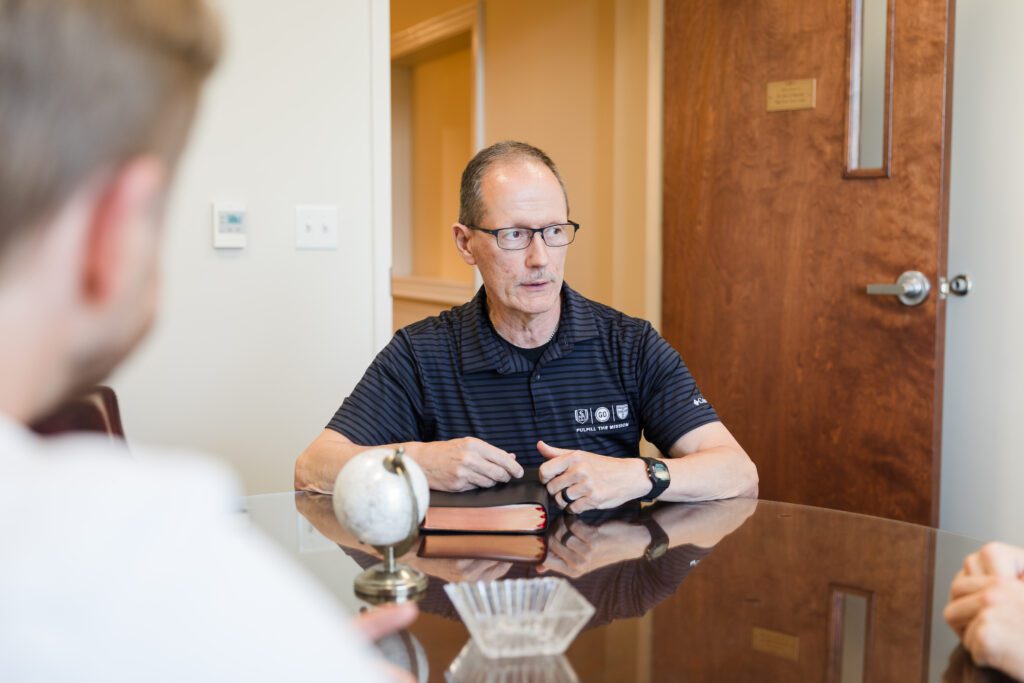When Harvard University was founded in 1636, its purpose was to educate new generations of American pastors and preachers. Its founders were English Puritans and Congregationalists who had been educated at Oxford and Cambridge and came to the new world to preach the gospel.
An engraving on the wall of Harvard Yard still records their original intention:
After God had carried us safe to New England and we had builded our houses, provided necessaries for our livelihood, reared convenient places for God’s worship, and settled the civil government: One of the next things we longed for and looked after was to advance learning and perpetuate it to posterity; dreading to leave an illiterate ministry to the churches, when our present ministers shall lie in the dust.
They didn’t just hire theologians and biblical scholars. They gathered classicists, poets, historians, mathematicians, and scientists. The first American educators understood a concept that had proved useful in the preparation of pastors for generations: a pastor with a broad understanding of the humanities is better prepared to preach, teach, interpret Scripture, and engage the culture than one who has specialized only in theology. This is perhaps truer today than ever before, as the pace of social changes accelerates. A preacher who understands the long course of human history can see most clearly that “there is nothing new under the sun” (Ecclesiastes 1:9).
Preachers are often among the best-educated members of society, but this education does not always include a strong foundation in the liberal arts. Two groups of pastors are especially prone to have this gap in their education. Some pastors, like myself, earn an undergraduate degree in theology or biblical studies, then pursue graduate-level seminary education. Others earn professional undergraduate degrees before attending seminary. These pastors may have studied only the standard liberal arts core curriculum required for an undergraduate degree. And let’s be honest: how many of us gave our full attention to history, philosophy, and literature courses during our college years? And how long ago was that?
Several years ago I began to seriously study the humanities, especially English literature. I have benefitted in many ways as a pastor and preacher. First, I have a broader base of human experience to draw from. Through literature I can vicariously enter the experience of a person very different from myself, but very much like some of the people to whom I preach. I have greater empathy because literature teaches me to see the world from perspectives different from my own. My study of history puts current events into a larger context. Philosophy is the “handmaiden of theology” and the more I study it, the better I can frame strong arguments and recognize weak ones. The study of the liberal arts stimulates imagination as well as reason. As preachers, we don’t just preach about God, we preach to people. The liberal arts teach us what it means to be human. The result of studying the liberal arts is that we become richer, deeper people who are better equipped to think and speak in ways that resonate with our audience. As a testament to the benefits of a classical education, Judson College’s Great Books curriculum is designed to expose students to the history of human thought precisely because this study is so valuable for every Christian- but especially for preachers.
Of course, our preaching ministry centers on the Word of God and is empowered by the Spirit of God. Human reason is no substitute for solid biblical exposition, and human wisdom does not replace the anointing of the Holy Spirit. Many great preachers have had little exposure to the liberal arts. John Bunyan, for example, was barely literate and may have read very little other than the Bible. But we do not have to choose between theology and humanities, between reliance on the Holy Spirit and growing in our own understanding of the world. We can, and should, commit to both.
How can you begin to study the liberal arts, even if your days of formal education are behind you? The traditional approach is to read great books. Homer’s Illiad and Odyssey, Aristotle’s Nichomachean Ethics, and Milton’s Paradise Lost are great places to start. More modern classics like Jane Eyre are worth your time. Get a library card and use it.
The internet has made a liberal arts education more accessible than ever. Many schools, from the ivy league to community colleges, have videos online covering history, philosophy, literature, and the sciences such as astronomy and biology. You can watch for free or enroll for credit. The world’s knowledge is at your fingertips.
As a preacher, you give God your best. A pure heart, clean hands, and a prepared mind are essential for ministry. Broaden your thinking to embrace the liberal arts, and see the benefits for yourself.

MDiv Preaching and Pastoral Ministry
The Preaching and Pastoral Ministry track prepares students for pastoral ministry in the local church with a special emphasis on expository preaching.



No comments have been added.